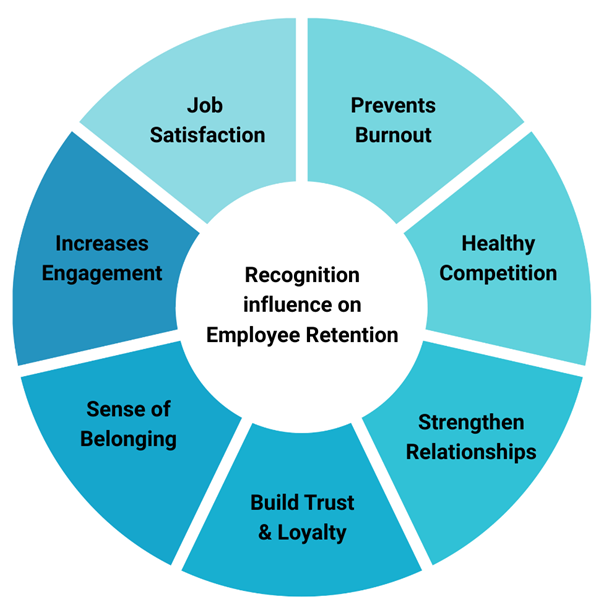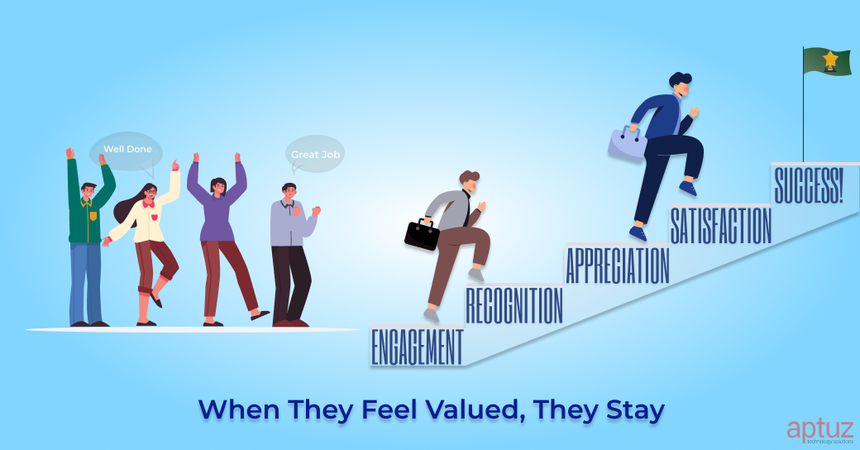“She stayed—not for the perks, but because her efforts were noticed and valued”.
In a time when many organizations struggle to hold onto their best people, take a different path one built on genuine appreciation and consistent recognition. Employee retention is not merely a hurdle to address, but a testament to a workplace culture where individuals are recognized, respected, and appreciated. I believe that recognition isn’t just a pat on the back; it’s a powerful strategy that fuels engagement and fosters long-term loyalty.
When employees know their contributions matter, they bring more passion, more creativity, and more commitment to the table. This approach will help in building not just a strong team, but a thriving one.
We will have a closer look at how timely, sincere, and thoughtful recognition drives employee satisfaction and long-term success.
Because when people feel valued, they stay and they grow with you.
How Recognition Influences Employee Retention

- Job Satisfaction:
Imagine putting your heart into something and hearing nothing back, not even a nod. That’s how many employees feel without recognition. A genuine “I noticed what you did” can make the difference between someone who’s just working, and someone who’s truly proud of what they do. Their job becomes more than just a paycheck it becomes a place they want to stay.
- Increases Engagement:
Employees who are recognized don’t just clock in they show up. They engage more, innovate more, and go the extra mile not because they must, but because someone noticed when they did.
- Sense of Belonging:
People don’t stay where they feel like outsiders. Consistent appreciation tells employees, “You’re not just doing a job here you’re part of our story.” That sense of belonging is powerful, and it’s one of the most overlooked reasons people choose to stay.
- Prevents Burnout:
Unnoticed effort is exhausting. A simple acknowledgement can recharge motivation far better than a coffee break. Recognition acts as a buffer, reminding employees their hard work isn’t invisible.
- Builds Trust and Loyalty:
Trust doesn’t come from titles or policies. It grows from small, consistent actions. When leaders take the time to recognize their teams authentically, employees feel respected. Over time, that builds a foundation of loyalty that’s hard to shake.
- Healthy Competition:
The right kind of recognition doesn’t make people compete. It makes them inspired. When one team member gets acknowledged, others aren’t discouraged, they’re motivated to rise too. That kind of culture brings out the best in everyone.
- Strengthens Relationships:
Recognition reminds us that behind every task is a person. And when managers offer appreciation thoughtfully and often, it builds more than morale. It builds relationships. People stay where they feel understood and supported.
Most Effective Ways to Recognize Employees
- Public Appreciation – Because Great Work Deserves a Spotligh
Applause shouldn’t be saved for big events. A quick shoutout in a huddle, on Slack, or in the newsletter can make someone’s day. These small, public moments of recognition boost morale, spread positivity, and encourage others to shine too. Gallup found that employees who receive public praise are 20 times more likely to be engaged at work.
Gallup. (2023). State of the Global Workplace: 2023 Report. Gallup, Inc.
- Monetary Rewards – Saying Thanks, the Practical Way
Sometimes, appreciation looks like a bonus or a surprise gift card. It’s a simple way to show that great work doesn’t go unnoticed—and it’s valued. And it works: companies that tie rewards to their values see 31% less voluntary turnover.
Bersin by Deloitte. (2012). The State of Employee Recognition.
- Peer-to-Peer Recognition – Because Kudos Mean More from Colleagues
Praise from leaders matters, but hearing “You nailed it!” from a teammate hits differently. Simple shoutouts or casual compliments build trust and strengthen team bonds. In fact, peer recognition can boost collaboration by up to 50%. JetBlue saw it firsthand—a 10% increase in employees feeling recognized led to a 3% rise in retention.
- Celebrating Milestones – Not Just Another Day at the Office
Big or small—every milestone matters. Be it a work anniversary, a project launch, or a personal win, take a moment to celebrate. A simple note or a small team gesture can leave a lasting impact. After all, people remember how they’re made to feel—and companies that celebrate milestones see 3x higher retention rates, according to OC Tanner.
O.C. Tanner Institute. (2020). 2020 Global Culture Report.
- Career Growth Opportunities – The Best Kind of Recognition
Nothing says “we value you” like investing in someone’s growth. Whether it’s a promotion, training, mentorship, or certifications, it shows we see their potential. And it pays off—94% of employees would stay longer at a company that helps them grow, according to LinkedIn’s 2023 Workforce Learning Report.
LinkedIn. (2019). 2019 Workplace Learning Report.
“People work for money but go the extra mile for recognition, praise, and rewards.”
— Dale Carnegie
Conclusion:
At the end of the day, people don’t leave jobs, they leave environments where they feel invisible. What we’ve seen through real stories like JetBlue’s rise in retention and Wipro’s culture of everyday appreciation is that recognition makes all the difference. When someone says, “I see you, and what you do matters,” it hits deeper than any policy ever could. It sparks pride, builds trust, and creates a sense of belonging that no paycheck alone can offer.
Because the truth is, people will show up for work, but they’ll stay when they feel valued. And in a world where talent is always on the move, that simple, sincere recognition might just be your company’s greatest competitive edge.

